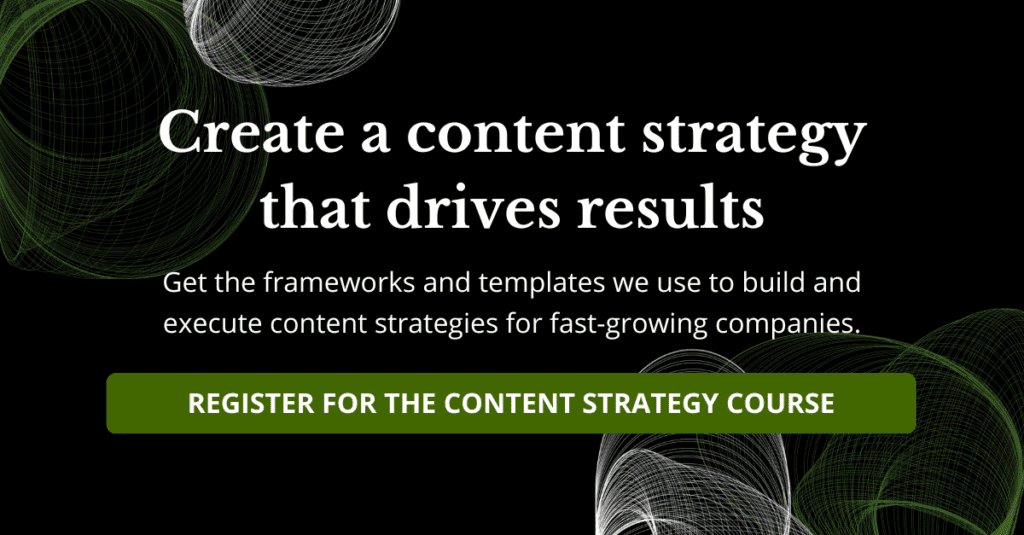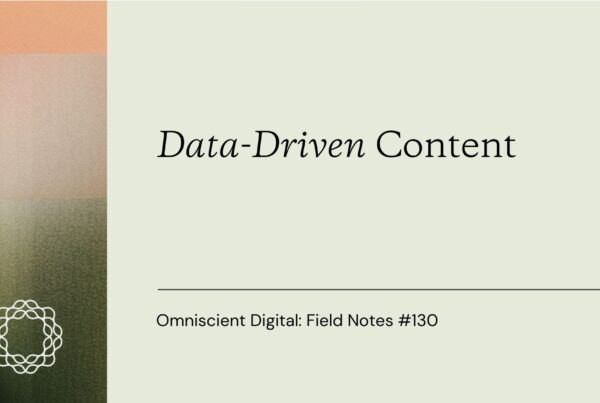
Don’t let the noise about Artificial Intelligence (AI) scare you.
While AI has become a controversial topic for skeptics and creators alike, the truth is this…
It’s simply a tool.
And an effective one at that.
But using AI without any human input rarely creates a successful outcome for search engine optimization (SEO) experts and marketers.
In fact, with the rise of E-E-A-T (Experience, Expertise, Authoritativeness, and Trustworthiness) and other preferences, Google is making it clear that balancing the value that AI can bring to an SEO strategy with human influence is crucial.
If you’re looking to improve site performance using AI and technical SEO, keep reading.
In this article, we’ll take a quick look at how AI is changing SEO and how to use it to create a sustainable technical SEO strategy. We’ll also discuss if AI will take over SEO.
Ready to learn more?
Let’s begin.
How is AI changing SEO?
Getting ranked at the top of the search engine results pages (SERP) is an impressive feat.
Maintaining search engine rankings is an entirely different story.
Thankfully, with AI tools, SEOs can learn valuable insights about how to produce better content and best practices to appease search engines.
For example, instead of solely focusing on specific keywords, AI has brought an emphasis on topic clusters and semantic search, which takes into account the context surrounding keywords.
This evolution in search prioritizes human-friendly and human-like content that’s rich in keywords, contextually relevant, and comprehensive.
For instance, if you offer social media scheduling software, you might have a focus keyword, such as “free social media scheduler,” that you use on your home page, product pages, and relevant landing pages. You probably also have blog content and Help Center articles that target this long-tail keyword.
But with a rise in focus on clusters and semantic keywords, you need to consider creating dedicated pillar pages and subtopic pages to form content clusters.
For this specific example, you might have the following cluster:
- Pillar Page: A published pillar blog article that targets the primary keyword “free social media scheduler.”
- Subtopic page: A published subtopic blog article that targets the semantic keyword “social media planning.”
- Subtopic page: A published subtopic blog article that targets the semantic keyword “scheduling platforms.”
- Subtopic page: A published subtopic blog article that targets the semantic keyword “automate social media.”
Conversion-focused SEOs also combine data from sales enablement systems. How? By using SEO tools that leverage AI, they can more quickly and easily understand how to create content that can increase visibility, convert customers, and move them down the sales funnel. 💰

In fact, SEOs identify the key objections and questions that prospects ask throughout the sales process by analyzing feedback and data from virtual sales assistants.
This information can guide keyword research and content creation strategy by helping SEOs focus on topics and keywords that directly address pain points and provide solutions.
A sales enablement system can also help SEOs understand which content assets are most effective in lead generation and conversion.
Can you use AI for technical SEO?
Beyond creating epic content based on search intent, you can also use AI to improve your technical SEO strategy.
By analyzing how tailored your site is for a positive user experience, AI can help pinpoint which specific aspects of your technical framework need improvement.
And if you’re new to creating websites, using AI website builders can help you kickstart the website-building process with SEO-friendly templates.
Let’s dig into this a bit further.
How does AI work for technical SEO?
AI can perform a variety of functions to help inform your technical SEO processes, including:
- Analyzing site performance: AI tools can assess performance metrics such as page speed, server response time, and rendering issues to identify areas for improvement.
- Identifying technical errors: AI can crawl websites and detect technical issues such as broken internal links, duplicate content, missing meta descriptions and titles, and incorrect schema markup.
- Providing website audits: AI-powered tools can conduct comprehensive website audits to evaluate factors like site architecture, crawlability, indexability, and mobile-friendliness.
- Assisting with structured data markup: AI can help identify opportunities to implement structured data markup to enhance search engine visibility and improve presentation in search results.
- Automating XML sitemap generation: AI can automatically generate XML sitemaps, ensuring all pages are included and regularly updated to facilitate proper indexing by search engines.
AI infrastructure plays a crucial role in supporting these AI-driven tools and processes, ensuring they operate efficiently and effectively. - Conducting keyword research: AI algorithms can analyze search patterns, search volume, user intent, and competitor data to provide insights and suggestions for effective keyword optimization.
- Monitoring backlinks: AI-powered tools can monitor and analyze backlink profiles to identify suspicious or low-quality backlinks and help manage link-building strategies.
- Assisting with natural language processing: AI-powered tools can analyze and understand the context and semantics of content to provide suggestions for optimizing on-page elements like headings, meta tags, and content structure.
- Conducting competitor analysis: AI tools for businesses can analyze competitor websites to uncover SEO strategies and content gaps that you can use to outrank competitors.
- Predicting search engine algorithm changes: AI algorithms can analyze historical data and trends to predict potential changes in search engine algorithms, helping SEO professionals stay ahead of the curve.
Now, let’s put some of these insights into action.
Scroll to the next section to learn how.
How to create a sustainable AI-driven technical SEO strategy
Now that we’re clear on the basics, let’s review how you can make better, data-driven decisions to improve technical SEO performance with AI insights.
1. Analyze and improve site performance
Use AI tools that analyze key performance metrics such as page speed, server response time, and rendering issues.

For example, if the analysis reveals that you have a slow page speed, the AI algorithms may recommend techniques—such as image compression, browser caching, or code optimization—to enhance loading times.
Use these insights to optimize your site performance for a better user experience and improved SEO results.
2. Identify and improve technical errors
Identify common technical errors such as broken internal links, duplicate content, missing meta descriptions and titles, and incorrect schema markup.
AI-driven tools can crawl your website and provide comprehensive reports highlighting these issues. For instance, if the analysis reveals duplicate content, the AI algorithms can provide suggestions to canonicalize URLs or optimize the internal linking structure to consolidate duplicate versions.
By addressing technical errors, you can make sure your website is in excellent shape for search engines to crawl, encouraging improved visibility and rankings.
3. Run a comprehensive audit of your website
Conduct a comprehensive website audit using AI-powered tools. These tools analyze factors such as site architecture, crawlability, indexability, and mobile-friendliness.
For example, if the analysis identifies issues with site architecture, AI can suggest improvements like creating a clear and intuitive navigation structure and implementing logical URL hierarchies.
By leveraging AI-driven audits, you can gain a deeper understanding of your website’s strengths and weaknesses and make data-driven decisions to enhance its performance.
4. Improve your structured data markup
Use AI insights to identify relevant data points you can mark up to enhance search engine visibility and improve rankings.
For instance, AI analysis might suggest implementing specific schema markup for products, reviews, or events, which can provide more detailed and informative search results.
By following AI-generated recommendations, you can supply valuable information to potential visitors, improving overall visibility and click-through rates.
5. Automate XML sitemap generation
Automatically generate XML sitemaps for your website with AI tools. These tools crawl your website and discover all pages to make sure your sitemap includes everything.
They also regularly update the sitemap as you add or remove new pages. By automating this process, you can save time and ensure search engines properly index all pages on your website.
Using AI for XML sitemap generation facilitates better crawlability and ensures that your content is discoverable by search engine bots.
Will AI take over SEO?
AI won’t take over SEO.
But using AI insights to inform SEO strategies will absolutely affect the way marketers approach both on-page and off-page SEO.

While you can apply AI insights more robustly to content-heavy aspects of SEO—such as topic ideation, semantic search, and writing blog posts—you can also use it for technical SEO to improve user experience. Nowadays, an AI writing generator tool can easily assist with optimizing for SEO.
But the bottom line is this:
SEO strategies still need an authentic human touch.
From understanding user intent to infusing conversational language, personal expertise, and storytelling, it’s human wisdom that makes content strategies as effective as they are.
Conclusion
Ultimately, it’s not the tools that make great SEO strategies but rather how we apply the insights we learn from these tools.
If you’re eager to uplevel your SEO game, don’t overlook the power of AI data to improve your technical SEO strategy.
And if you’re looking for an organic growth partner to help you tailor your approach, Omniscient Digital is here for you, with specialties in both technical and content SEO.
Book a strategy call today to learn more.



